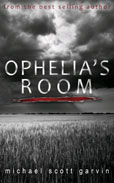
 |
What's this multi-layered novel about? One could say it's about gruesome murders, for there certainly are some between its covers. One might conclude it's about familial relationships. Yes, there are plenty of those within its pages. One could argue it's about religion because faith of one kind or another is never far from one chapter to the next. Yet, with all of the aforementioned aspects intertwining throughout this novel, it's perhaps first and foremost about forgiveness: how hard it is to find, how difficult it is to give, and ultimately coming to grips with what it means to accept or reject it.
The setting is a small town in Kansas, with most of the story taking place in the late 1960s and early 1970s. While there are several memorable characters, those playing the largest roles are Delia and Charlie, a young married couple who initially suffer a horrendous tragedy. Then there's Lloyd, Delia's father, who visits unspeakable evil not only on his daughter and son-in-law but also upon a variety of unfortunate individuals who come in contact with him. Another standout is Betty, a young school teacher who hides a secret life and suffers unjustly for it.
Several supporting characters also figure prominently in the tale. For example, Doyle and Thelma are Charlie's continually grousing parents. Then there's Jugs, Charlie's good-old-boy best friend, and old widow Ellison, a neighbor who keeps to herself with her frequently barking dog. Father Delany, a Kansas prison chaplain, pines for his New York City home. One must also include Lloyd's mother. Though long dead as the story begins, recollections of her reveal a grotesquely abusive parent whose brutal child-rearing policies result in an incredibly disturbed offspring.
One hesitates to be too specific about plot points, as multiple revelations throughout are more impactful if experienced as one reads. But here's a non-spoiler summation: Ophelia, of the title, is Delia and Charlie's infant daughter, who does not survive the story's beginning. The remainder of the intricate narrative bounces back and forth between the small town where the principal characters interact and the prison where Ophelia's grandfather is incarcerated. Delia and Charlie's grief, in the aftermath of their baby's death, plus their means of coping with it, carry the majority of the chronicle, while Lloyd's sessions with Father Delany attempt to explore the demented man's twisted religious zealotry and his reasons for committing the atrocity that landed him behind bars. Eventually, this psychological thriller becomes physical when Lloyd escapes from prison and begins to make his way back to Delia and Charlie's home.
Author Garvin is an exceptional storyteller who fills his tale with insight, empathy, and intensity. One feels a connection to his characters, whether they're angelic or evil. He delves into behaviors and motivations that are part and parcel of us all. There is a sense of honesty that is pervasive throughout. The story's pace feels neither rushed nor lethargic. Backstories for each of his principal characters heighten understanding and interest in them, though Garvin never lingers too long on the past. He keeps the action continually moving forward. This author also has an ear for the way people speak. His dialogue is conversational and true to the voices conveying it. While most of the insular situations he depicts are emotionally involving, he's more than adept at delivering fear and suspense when appropriate. Garvin also captures, in frequently moving language, the sense of timelessness, awe, and the often below-the-surface despair of the prairie landscapes that reach to horizon's end. Excellent writing, memorable characters, and a compelling storyline make this a novel to be enjoyed while reading and remembered long afterward.
RECOMMENDED by the US Review